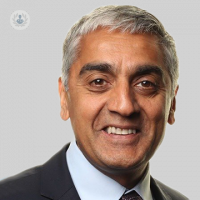It runs in the family: inherited heart disease
Written by:There are various factors that can cause heart diseases; abnormal genetics being one of them. Award-winning London-based consultant cardiologist Professor Sanjay Sharma explains what inherited heart diseases are, detailing some common examples.
Professor Sharma also discusses how these diseases are tested for, answers some frequently asked questions such as if they are preventable and whether they're more likely to come from one parent than another.

What is inherited heart disease?
Inherited cardiac conditions are diseases that are caused by genetic abnormalities which can affect various parts of the heart. The heart muscles are affected by faults called cardiomyopathies, of which the most common is a condition called hypertrophic cardiomyopathy present in between one in 200 to 1 and 500 individuals in the population.
There are other conditions that may affect the left and the right ventricle, such as arrhythmogenic ventricular cardiomyopathies. Other genetic diseases affect the electrical system of the heart and these are called ion channelopathies and examples include:
- long QT syndrome;
- catecholaminergic polymorphic ventricular tachycardia (CPVT);
- Brugada syndrome, and;
- progressive cardiac induction tissue disease.
There are some other genetic faults that may affect the aorta, the main vessel of the heart. These are called aortopathies and the sort of diseases that give rise to those types of autopsies include things like Marfan syndrome. Collectively genetic diseases do affect a significant proportion of our population, it’s estimated that around 1 in 200 individuals probably do have a genetic disease that could possibly cause trouble during intensive exercise.
What are the most commonly inherited heart diseases?
The most commonly-inherited cardiac condition is a condition called hypertrophic cardiomyopathy. It’s a disorder of heart muscle characterised by abnormal thickening of the heart muscle and often a relatively stiff pumping chamber. The vast majority of people that have this condition are not able to exercise at a very high level. This condition, however, is heterogeneous, meaning it varies in how thick and stiff the heart muscle is. Some people with very mild forms of the disease or very localised forms of thickness can engage in intensive exercise. It's recognised as the most common cause of exercise-related sudden cardiac death.
Other genetic diseases are considerably rarer than hypertrophic cardiomyopathy. There is a condition called arrhythmogenic cardiomyopathy which may affect the right ventricle or the left ventricle and is due to abnormalities in desmosome proteins, this is the cardiac glue. Theoretically if you exercise intensively and you've defective glue joining yourselves up then there's a chance that glue may come apart and cause trouble. This condition is present in about one in 1500 individuals.
There's another condition called dilated cardiomyopathy which has its name suggest is characterised by an enlarged main pumping chamber that doesn't work very well this is present in around one in a thousand. There are some of previously mentioned the electrical faults, such as long QT syndrome or Brugada syndrome which are present in around one in two thousand individuals.
How do you test for inherited heart disease?
Most inherited heart diseases affect either the electrical tissue of the heart or the heart muscle so the most pragmatic methods of testing involve an ECG and an echocardiogram. The ECG may show things like long QT syndrome, Brugada syndrome and may even show lots of ventricular extra systoles arising from different parts of the heart that characterise a condition called catecholaminergic polymorphic ventricular tachycardia.
We then have to do an echocardiogram, which looks at heart muscle structure and function. It is very good at picking up conditions like hypertrophic cardiomyopathy and dilated cardiomyopathy but there are certain conditions that manifest themselves in a rather subtle manner, such as arrhythmogenic cardiomyopathy that may require more detailed imaging such as a cardiovascular magnetic resonance imaging scan.
If we do diagnose people with inherited heart disease, other investigations are required either to confirm the disorder or to check for the risks associated with these diseases. These tests include an exercise stress test or a form of prolonged ECG monitoring.
Can inherited heart disease be prevented? Why or why not?
Inherited cardiac diseases are caused by genetic abnormalities. There’s no way to prevent these diseases because you're born with a genetic mutation that predisposes you to get a condition. It is possible to identify diseases early and treat them to prevent either deterioration in heart muscle function or reduce the risk of sudden cardiac death.
Can inherited heart diseases skip a generation? If so, how often does it happen?
Genetic diseases may skip a generation, meaning one of your parents may have the disease and they may pass on that fault to you and you may not necessarily express that disease fully. You can have a gene and when clinical tests are performed, no features of the disease will be found but you could potentially pass the dormant gene on to your offspring who may have a full form of the disease. Although possible, it's not common, occurring in about 5 per cent of families.
We are now in a position where we can readily perform genetic testing which reduces the chances of a genetic abnormality skipping generations. That being said, we can’t test for all faults that cause these conditions yet. We only know 70% of the faults that cause hypertrophy cardiomyopathy, around 50 % of the faults that cause arrhythmogenic cardiomyopathy, and 70% of the faults that cause long QT syndrome, so there's still a lot of work to be done.
In some cases, even if the abnormal gene is present, sometimes it needs to be triggered by another gene. This might be why one family member has a mild version of the disease, and another person in the family may have it more severely.
Are inherited heart diseases more commonly passed down from the mother or father? Why?
Theoretically speaking, the gene should be passed down equally. There is a 50/50 chance that a child will inherit abnormal DNA from the mother’s or the father’s nucleus.
There are very rare conditions where the DNA is not in the nucleus but is in the mitochondria. We only inherit our mother's mitochondria, we don't inherit the dad's mitochondria, so if it's a mitochondrial genetic mutation then that can only be passed on by the mother. It's important to emphasis though, that males generally if they inherit the disease are usually more prone to a more serious form of the disease compared to women, especially with cardiomyopathy.
If you are interested in booking a consultation with the revered Professor Sharma, you can do so by visiting his Top Doctors profile.


